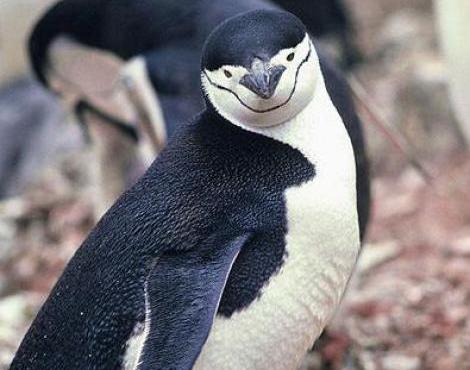World Penguin Day; Highlighting the Decline of Chinstrap Penguins.
April 25th is World Penguin Day and what a good opportunity to highlight the decline of one of the world's most adorable penguin species - the chinstrap penguin. Chinstrap penguin numbers have fallen more than 58% since 1971 and the decline has been linked to climate change and fishing for forage fish species.
Chinstrap penguin: Source: Photosnap
Monitored seabird populations which are useful sentinels of marine ecosystem health have been declining around the world at a rapid speed.
The Antarctic is one the world's wildest ecosystems, but researchers are very concerned about the impacts climate change and melting sea ice is having on adult chinstrap penguins ( Pygoscelis antarcticus
). Recently, a team of four scientists from Stony Brook University in New York spent more than a month counting chicks in the South Shetland Islands. The team used drones and handheld clickers to count the penguins and found 52,786 breeding pairs on Elephant Island. This was 58% lower than the last survey that was conducted in 1971. However, the penguins appear to be breeding consistently so the researchers were more concerned with what is happening to them as adults - which they think is down to climate change and the fact that the sea ice is melting faster which is disrupting the food chain.
Human-driven warming has driven up winter temperatures along the Antarctic peninsula by 5C above pre-industrial levels, one of the fastest increases in the world. Recently, the Antarctic peninsula recorded a new high of 18.3C, surpassing the previous record of 17.5C.
A similar study carried out on the south Shetland Islands in 2016/2017 also used drones to count penguins and covered a distance of 317km to determine the exact posiiton of 14 chinstrap penguin colonies, including two small unknown colonies and found a total abundance of 35,604 adults, revealing a decline in the total abundance of occupied nests in comparison to previous studies. However, they also found four chinstrap colonies that had grown since the 1980's against the general trend on the South Shetland Islands.
Another study using similar methods on Penguin Island and King George Island estimated a total of 4,290 of two penguin species Adelie and chinstrap which suggested a decline of 68.29% in both penguin species in the 1980 - 2016 period.
In addition to climate change, human pressures for fishing for Antarctic krill which is targeted by the largest fishery in the Southern Ocean are impacting penguin populations. A new study published in the journal Scientific Reports
has shown that precautionary removal of key forage fish species such as krill, which top predators like penguins, depend on, is predicted to further impact penguin populations.
© Ocean Research & Conservation Ireland (ORCireland) and www.orcireland.ie , est. 2017. If you like our blogs on the latest news in marine science and would like to support our work, visit www.orcireland.ie to become a member, to volunteer or to make a donation today. This article has been composed based on credible sources.
References
:
www.theguardian.com
Korczak-Abshire, M., Zmar, A., Rodzewicz, M., Kycko, M., Karszinia, I., Chwedorzewska, K.J., (2019). Study of fauna population changes on Penguin Island and Turret Point Oasis (King George Island, Antarctica) using an unmanned aerial vehicle (UAV). Polar Biology
, 42
(1), 217-224.
Oosthuizen, W.C., Kruger, L., Jouanneau, W., Lowther, A.D., (2020). Unmanned aerial vehicle (UAV) survey of Antarctic Shag (Leucocarbo bransfieldensis) breeding colony at Harmony Point, Nelson Island, South Shetland Islands. Polar Biology 43
, 187- 191.
Pfiefer, C., Barbosa, A., Mustafa, O., Peter, H.U., Rummler, A.B., (2019). Using fixed-wing UAVs for detecting and mapping distribution and abundance of penguins on South Shetland Islands, Antarctica. Drones,
3
, 39.
Watters, M.G., Hinke, J.T., Reiss, C.T., (2020). Long-term observations from Anartcica demonstrate that mismatched scales of fisheries management and predator - prey interaction lead to erroneous conclusions about precaution. Scientific Reports
, 10
, 1 - 9.
SHARE THIS ARTICLE














